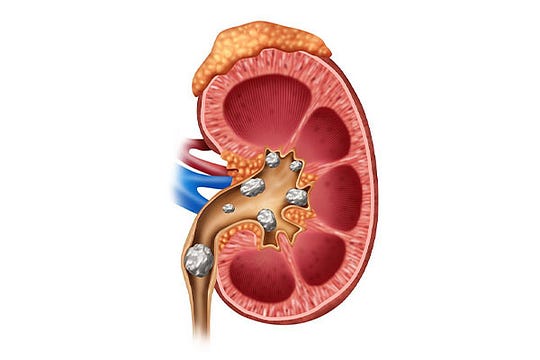Introduction:
Kidney stones, those tiny but formidable crystalline structures, can wreak havoc on our well-being. Understanding the factors that contribute to their formation is crucial for preventing their recurrence and managing their impact on our health. In this article, we’ll explore the various causes of kidney stone formation, shedding light on the dietary, genetic, and lifestyle factors that play a role in their development.

1. Dehydration:
One of the primary culprits behind kidney stone formation is dehydration. When we don’t consume enough fluids, our urine becomes more concentrated, making it easier for minerals and salts to crystallize and form stones. Insufficient hydration reduces the volume of urine, allowing these substances to accumulate and clump together, eventually leading to the formation of kidney stones.
2. Dietary Factors:
Our dietary choices can significantly influence the likelihood of developing kidney stones. Foods that are high in certain minerals, such as calcium, oxalate, and salt, can increase the risk of stone formation. Oxalate-rich foods like spinach, beets, nuts, and chocolate, as well as high-sodium foods, can contribute to the formation of calcium oxalate stones — the most common type of kidney stone. Similarly, consuming excessive amounts of animal protein, particularly red meat, can lead to the accumulation of uric acid, another common component of kidney stones.
3. Genetic Predisposition:
Genetics also play a role in the formation of kidney stones. Individuals with a family history of kidney stones are more likely to develop them themselves, suggesting a genetic predisposition to stone formation. Certain genetic disorders, such as hyperoxaluria and cystinuria, can increase the risk of specific types of kidney stones by affecting the body’s ability to metabolize and excrete certain substances properly.
4. Medical Conditions:
Underlying medical conditions can contribute to the formation of kidney stones. Conditions that affect the balance of minerals and fluids in the body, such as hyperparathyroidism, renal tubular acidosis, and urinary tract infections, can increase the risk of stone formation. Similarly, metabolic disorders like obesity and diabetes can alter the body’s metabolism and increase the concentration of certain substances in the urine, predisposing individuals to kidney stone formation.
5. Medications:
Certain medications can also increase the risk of kidney stone formation. Diuretics, commonly used to treat high blood pressure and heart failure, can increase urine production and lead to dehydration if not accompanied by adequate fluid intake. Similarly, calcium-based antacids and supplements can increase the concentration of calcium in the urine, potentially leading to the formation of calcium-containing kidney stones.
Conclusion:
Kidney stones are a common and often painful condition that can affect individuals of all ages. By understanding the various factors that contribute to their formation, we can take proactive steps to minimize our risk and promote urinary tract health. Stay hydrated, maintain a balanced diet, and consult a healthcare professional if you have a family history of kidney stones or underlying medical conditions that may predispose you to stone formation. With proper awareness and preventive measures, we can reduce the burden of kidney stones and enjoy better overall health and well-being.
Comments
Post a Comment